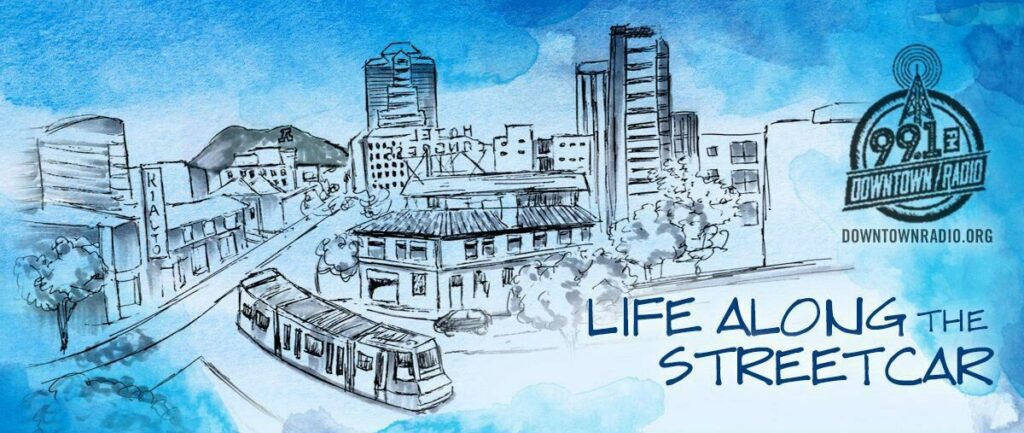Transcript
Tom Heath
Good morning. It’s a beautiful son in the Old Pueblo, and you’re listening to Katy DT Tucson. Thank you for spending a part of your brunch, Our with us on your downtown Tucson Community sponsored rock and roll radio station.
Tom Heath
On this week’s show, we’re going to speak with the Zach Yentzer. He’s a man who wears many hats in our community. And today, the hat he’s wearing is of a homeowner, an advocate for policies to promote affordable housing, especially in our Urban Core.
Tom Heath
Today is September 26th My name is Tom Heath, and you’re listening to Life along the streetcar each and every Sunday. Our focus is on social, cultural and economic impacts And Tucson’s Urban core. We shed light on hidden gems Everyone should know about from a Bound to You, Arizona and all stops in between. You get the inside track right here on 891 FM Streaming on Downtown Radio dot org Available on your iPhone or Android, simply head over to your app store and get our very own Downtown Radio Tucson app. And then we’re in your
Tom Heath
pocket wherever you go. If you want to reach us on the show, or email us contact at Life along the streetcar dot-org, you can interact with us on Facebook and Instagram. Our podcast is pretty much anywhere You can find podcasts, including asking your smart speaker to play Life along the streetcar podcast. And all of our past episodes can Also be found on our website, Life along the streetcar. And once again, you have to say it that way. Life along the streetcar. Well, I guess today is a cancer. We’re going to get into his story in a moment. But we did his interview a little bit in advance of a meeting from a Planning Commission. And I want to give you the results of that commission and then will lead into mr. Yin sirs interview. But the there’s a Planning Commission that held a virtual meeting on September 15 And they listen to speakers. They read written commentary. And after all of the input, the commission voted nine to one. I’m sorry, 920 to recommend a proposal for allowing accessory
Tom Heath
Dwelling units to be on properties in the Tucson area. This will be a code Amendment. And they also encouraged mayor and Council to develop programs, providing resources and Technical Support to make these accessible Every dwelling units, also known as adus more affordable. The goal would be to put this plan, This code Amendment into place and evaluated over a couple of years to see how it impacts homeownership and impacts, housing, opportunities, costs, Etc. Now, there certainly are some considerations for this That might be negative for some homeowners. But the overwhelming response is seem to be pretty positive. And our guest today is Zack. You answer, he’s been on the show as the host of his very own radio show called The Tipping Point, where he’s up to date on current affairs. He’s the executive director for the Tucson young professionals. He’s an active member in our community and someone whose opinion I value And I’ve seen on Facebook a lot recently, where he has been promoting different
Tom Heath
housing suggestions on helping affordable housing for all levels across the Spectrum. They’re not just The workforce housing, but affordable for anyone that wants to live in the downtown area. And that includes his charge of young professionals. So I sat down with him again. This was a couple of weeks ago. So I was right before this meeting on the 15th and talked about the history of this potential code Amendment, as well as some other housing opportunities. So we’ve had you on the show as the executive director of the Tucson young professionals we’ve had you on as host of The Tipping Point on kvo I I think we’ve had you on as a member of the downtown to Partnership board. And I think today we’re talking about your capacity, and as a homeowner in your research that you’ve been doing and on housing, and the impact of some potential code changes here in the City of Tucson, Is that sound about right for you?
Zach Yentzer
It is, yes, I would say this is my neighborhood association had on today. I’m not speaking for Menlo Park neighborhood association in terms of a neighborhood position or anything, but as someone Um, who’s working on housing issues as a part of, you know, neighborhood association, life in the urban core? Yeah, definitely getting a first-hand Look at what’s what’s being considered at the city level right
Tom Heath
now. And let’s set a little bit kind of a, some time frames here, because this is a fluid discussion that’s ongoing. We’re recording this. It’s actually September 14th I think there’s a public meeting tomorrow V, correct. And this is going to air on the 26th of September. So there’s going to be a little bit of a gap in there. So we’re going to talk about what we know today on the Only on the 14th, and that if there’s updates or changes between now and when this airs, we can do that on the show on the show, I can just kind of edit that in there. So it is a fluid conversation and lots of things happening with that. But give us the backstory. What’s before we get into these proposed changes? Kind of where is this coming from? What’s the thought process behind? Even making changes in the way residential Lots are used here in Tucson?
Zach Yentzer
All right, for sure. Well, it’s interesting. You know, Tom. You and I go back in conversation a number of years. I think we can proudly or sadly, say, one of the two that we were kind of among the first group of people for five, six years ago in Tucson that said, hey, we’re heading towards a housing crunch, a housing crisis where supply and demand are not Connected and in sync, and where we aren’t figuring out fast enough How to create the right kind of housing Supply, A cost of across the spectrum of affordability, snot just Section 8 or Workforce housing, but housing that is across a spectrum of affordability for different incomes. We’re not doing that strategically enough fast enough. And as Tucson was revitalizing, you know, coming out of the streetcar and Rio Nuevo and some of the Buzz that was happening around Tucson, I think you and I were among the first to say, hey, wait a second. Hey, to think more strategically around housing. And to answer your direct question, something that
Zach Yentzer
I’ve become really interested in in Tucson and just in general is that different Market forces and funding structures and kind of how the housing market Works in America today really centers around either the single family house and single-family zoning, or the big multi families, F the apartments, mixed-use so on and so forth. What’s missing in the middle is what people call the missing middle. And that is the stuff that Americans used to make and used to do in the early Nineteen Hundreds, your duplexes, Your Triplex is your accessory dwelling. Use your Casitas, your granny Flats. There used to be this whole middle ground that, you know, Joe and Jane Jones were filling in America. And for whatever reason, it was Has now shifted to either it’s one unit on a single film lat, or it’s this big, multi family structure. And we’ve lost that missing metal And so enter accessory dwelling units, which, by the way, are not new to Tucson. People have said, hey, I have a certain size lot yard. Why
Zach Yentzer
don’t I build, you know, a little, a little flat for my mother-in-law, or, you know, 500 700 square feet For one of my family members to stay order, rented Out. They just haven’t been legal in Tucson up to this point. They’ve been done, but they haven’t been legalized. And so the City of Tucson, I think it was wise to do. So we’ll see where it goes. But the City of Tucson started this zoning change process to basically legalized, Accessory dwelling units, certain sizes on certain Lots that opens up the ability for better financing for nonprofits Also get involved and help Families across the socio-economic, you know, Spectrum, be able to build these. And to, in my words, allow more people to create more housing for more people, because we just need more Supply. And I think the exciting benefit of these when get into it here is I think it’s either creating more multi-generational housing, or it also creates income property for middle class families In Tucson, All of which is Noble, all of
Zach Yentzer
which is needed. And I think it helps to In some of that missing middle housing I talked about, and I’ll stop here after this time. But I think what’s interesting is that whenever we talk about how to create more housing for more people, especially in the urban core, all these different tools get talked about as if they are the only tool that can solve the problem. And so you get these existential conversations around. Well, you know, are we relying on Accessory dwelling units 80 use to solve housing in Tucson? No, it’s one tool of what needs to be Be many in the toolbox to create more housing Supply in the right kind of housing Supply. And those both those two things are needed. So that’s what’s kind of going on. We’re talking on the 14th tomorrow. And the 15th was a Wednesday in the evening. The Planning Commission is going to look at what the City of Tucson is proposing, and they’re going to make their final decision. And they’ve heard everybody’s heard a lot from the community pro and
Zach Yentzer
con, if the Planning Commission Lights this, it then goes to Marin Council later in the fall of this year. And the hope is that Marion Council will also green like this and get the ball rolling.
Tom Heath
Now you studied this quite a bit. Are you familiar with what’s been going on across the country? Because other cities are dealing with this, or they are they doing the same thing, or they taking different approaches.
Zach Yentzer
Yeah, Yeah, It’s, it’s interesting. I mean, it’s comforting in the sense that this is not a Tucson problem. This is an urban problem, Right? And every actually had a chance to hear Richard Florida One of the world’s top urbanus. He said, every city. And we heard this in Tucson, Tom. Every city thinks that they’re going to be spared from the affordable housing crisis. And and nobody does get to be spared very, very few. So, I mean, this is happening around the country. You know, I have a really good friend who’s done a lot of research on this. And I believe she was Me about Portland and Los Angeles. Two cities that looked the accessory dwelling unit situation and Portland kind of over-regulated it and put a lot of restrictions on, on what individual families could do around accessory dwelling units. And then very few people took advantage of it. One of the things we’ve heard in Tucson that I know we hear around the country is a call for these accessory Dwelling units to be A pied, right.
Zach Yentzer
And so if the owner is not going to be a part of occupying them, then then the city, you know, should not allow that to happen. The the problem that I that I’ve seen is that is that Banks want to see more options before they will loan the money as an example or height, right? Maybe. Maybe there needs to be, you know, that a demons would be two-story regulating, that if you put too many of these restrictions, Design Engineers regulations, then what they found to be true in Portland is that very people, people build them, and they actually went back and had to amend their code. I believe this Portland to be a little bit more open handed. I love what the City of Tempe has done. Tempe has basically looked at their entire community and said, okay, what kind of housing do we need across our spectrum of incomes and how much? Right? You know, we need 10 of this 10 of this 10 of that’s okay. Go build it. And, you know, I think we’re a little bit further behind in that in Tucson. I love to see not
Zach Yentzer
just a strategic plan around it, which I know is in the works. But you know, some of us have been talking for two or three years Strategically about affordable housing, Housing, accessibility, housing, affordability and very few units are getting done fast enough. I think we’re 10000 units of affordable short here in Tucson, Where a hundred fifty thousand short Workforce housing, your nurses, your firefighters, your police, your teachers, or a hundred fifty thousand units short for working families and working professionals across the State of Arizona. That’s a conservative number. So, you know, I think we’re seeing some of those Dynamics Los Angeles. I’ll close with this story. I believe it was Los Angeles to those two, kept A more of an open handed approach on their accessory Dwelling unit zoning change. And they seen tens of thousands of these develop. And the data points to not that bees are being used for airbnb’s, which is what we’ve heard. You know, the short term rentals. We’ve
Zach Yentzer
heard this as the concern of what the worst case could be the majority, whether or not you regulated as owner occupied Our owner-occupied there, either income Properties or, or they are multi-generational, so that their family can can move with them on that lat. I’m excited that I think it’s a great That’s a great Tool. And like you said, Tom, the ability to do more smart infill development and to allow to be accessible to a greater diversity of people, I think, is one of the best things we can do in this town, whether you care about housing, whether you care about economic growth, whether you care about climate and sustainability, whether you care about multimodal Transportation, figuring out how to Here’s the zoning Channel planning word, how to densify smartly is kind of the, you know, is the The is the is the goal. And I think this goes a long way to doing it.
Tom Heath
An exact answer. He is among many things in Tucson and advocate for affordable housing policies that affect a wide swath of income levels. My name is Tom heathy listening to Life along the streetcar on Downtown Radio 991 FM and available for streaming on Downtown Radio dot-org.
Tom Heath
Alright, let’s finish up our interview here with this a cancer. Again, The accessory dwelling unit amendment has been passed from the Planning Commission to the staff and mayor and Council as a favorable. And I also wanted to find out from Zach other programs. He’s heard in other parts of the country, including one that we had the opportunity here to create called Stackhouse, but they ended up moving to Denver. So here’s the second half of our interview with Zach answer.
Tom Heath
What are some butter? Some other things? You know, I’d kind of like to talk, If you don’t mind, just briefly like about Stackhouse, which I know ended up in Denver versus here. But, you know, tell us about some of these other creative ideas that are, that are floating around on how to sort of reimagine a re-envision, What housing looks like in an urban
Zach Yentzer
area, Right? Right? Yeah. I think, you know, it’s honestly to me, kind of a shame that Stackhouse couldn’t make a go of it here in Tucson. They were Tucson born, and bred Tucson had the opportunity to be kind of the the first sight of this, and for a variety of reasons, and we can let them tell their story, It didn’t get to work out, but they’re in Denver and doing really well. And and this Vision was to provide, how is he? A tiny home, But kind of a Unit in the in the, in the method of a like a like a cargo? Yes, I saw a shipping container. Yeah. And it provides housing that you can move in and move out of. The goal is sites all around the country and the world and because of its size, and because it was, you know, multiple units and kind of a stacked format in a frame. So Stackhouse, then you are using height. You’re using Seeing smaller units. You’re getting better affordability. And but you can still live in the urban core. And it wasn’t affordable section A, but it was. Affordable
Zach Yentzer
in the sense of affordable to, I think, more people who make around what two sons median household income is, which is around 45000. It’s hard to make 45k in the downtown right now. And so that was a really cool model. It was a for-profit kind of Market based model That was, that was really cool, You know, look at Tom at the local level. It really comes down to zoning and Regulation and permitting the faster and easier. Those three themes are. It allows more people to create more housing. You know, I get excited about mixed-use. We know where there’s retail on the bottom and living up on top. You know, allowing more people the opportunity to do these duplexes, triplexes, condos and Townhomes, Tom, as well as kind of fits in that missing In that missing middle. You know, at the local level, a lot of it comes around Innovative, zoning, faster permitting and lesser regulation. And then after that, what actually gets to be, they’ll often comes down to funding. And there’s some interesting funding
Zach Yentzer
models out there, I think, I think Minnesota and I need to fact-check myself on this. Minnesota figured out how to basically, you know, how? If your nephew goes to a private school, for example, You can basically support him going to that school. And then it’s, you know, it’s a break on your taxes. Instead of giving the state or the federal, or I’m sorry, the state money it goes to, you know, a private education. Well, they figured out how to do the kind of the same thing with like a with housing Other words. You can allocate your tax burden towards a housing kind of fund that the state can then use in Partnership With local cities, provide more dollars for affordable housing. So I think there’s some for some of the Innovation is that could be really cool.
Tom Heath
You’re allowing your crowdfunding through a tax taxes. That’s pretty interesting. You know, I think when people start, I know there’s a lot of pressure and public comment about developers needing to do things with affordable housing. But some of the things that you touched on it makes it difficult when you got certain burdens that are going to add Certain costs to your project. And I’m talking to developers, There’s many reasons why some of these units aren’t being built because of what they end up needing to get out of it If they don’t get some type of subsidy for writing for the construction of it. So it does certainly has a multi-layered effect on the specifically in the accessory Dwelling units, Just as we wrap up here. Are there any specific objections? I mean, are there are there people lined up against this? Or are you saying most people in favor Just wanting to make sure that there’s some Luxury boundaries around it?
Zach Yentzer
Yeah, you know, what’s interesting Is that on the one hand, there’s probably more support for this in terms of housing than we’ve seen safe for maybe the sunshine mile. So the sunshine mile, Speaking of innovation, was basically, you know, if a you know, a developer could opt in to a different development option and get some benefits by providing Affordable units within within that mixed use development on the sunshine mile. So that kind of a density bonus, if you will. But I’ve, on the one hand, heard people in support of this. But there are the naysayers out there. And, you know, the Planning Commission. My understanding was where they were really supposed to pass this on to Mayor and Council back in their July meeting. And they heard enough Community concern that they kind of pulled back and said, Let us give us another couple of Of months. It’s my understanding what happened, which is what brings us to September 15th but, you know, concerns that I’ve heard are, and I don’t think this
Zach Yentzer
will be a very common occurrence, but the zoning change would allow you to build up to 25 feet, if that is what your lot is zone for. And so there’s concern around, Well, what is it? What is a new two-story? You know, what would a two-story development? You know, as my neighbor? What would that Do? I think that’s going to be not a common occurrence. But there is a height allowance there I’ve heard, you know, concerns about Will this be short-term rentals? The data points to a minority of these units becoming short-term Airbnb rentals concerns about parking. And, you know, will will this, you know, just being lots of cars and traffic on our streets. Think there’s ways there’s ways around Round that I’ve heard. Well, what does this mean for historic neighborhoods? My understanding is that whatever, If you’re in a historic preservation, known zone, or a neighborhood preservation Zone, all those requirements would apply to the Adu that you want to build. So it’s not like you live in an HPV
Zach Yentzer
or an NP Z. And then all of a sudden, you have this kind of Reckless 80 you being built concerns about, Well, if we have really large Lots, you know, do these become kind of mini door Type situations where you have an Adu and other units on these large lots. And I’m reading some considerations of that as well. So there’s a lot of here’s the worst It could be. I don’t think the data points to that happening. I think the pros, you know, outweigh the cons, but we have to honor, We have to honor the cons as well, and discuss all that could go wrong and try to make sure that whatever gets past is is the is the best. But we can always go back and edit as as well. I think we get stuck trying to create perfect policy. There’s no perfect policy.
Tom Heath
There’s no perfect policy, and we’ll link to the planning departments. They’ve got some information which I pulled off your Facebook page about Casitas in Tucson. The talk about some of the benefits like cool roofs. And yeah, Special dispositions, if it’s near public transit and that type of thing. So we’ll link to that went exact. I want to thanks for your time and energy on this. If you want to hear more from mr. Zacchi answer, you can tune in on just about what They write. Nine
Zach Yentzer
o’clock Every morning, every day, Monday to Friday 9 to 10 on am 10:30 Kvy The Voice,
Tom Heath
the Tipping Point. And if you are a young professional and you’re not involved with the Tucson Professional Network, you certainly might want to look up Zack and chat with him about those opportunities, because that’s driving. A lot of the conversation about housing is that spectrum of affordability that you keep referring to is a cola be looking for updates here after the meeting. And I’m sure we’ll be touching base later in the fall about some updates. In the meantime, appreciate your time and all your efforts on
Zach Yentzer
this sounds Great and talk. Thanks for all you do for the community. We appreciate it.
Tom Heath
That was that cancer. And if you want to learn more about these accessory dwelling units and what the Planning Commission proposed, We’ll have some links on our Facebook page right after the show. Oh, my name is Tom Heath, and you are listening to Life along the streetcar on downtown radio 981 FM and available for streaming on Downtown Radio dot-org. This podcast is sponsored by the mortgage guidance group and Nova Home Loans. If you enjoyed this podcast, keep listening, or head over the Life along the streetcar dot org for all of our past episodes, current events and things to do While visiting Tucson, Tom Heath and Among Us number 182 420 Nova animal S number 308 7bk number 0 9 0 2 4 2 9 Equal Housing
Zach Yentzer
Opportunity.
Tom Heath
Hey, and while you’re over there, getting your swag on, Why don’t you check out all of the lineups that we have from our different volunteer DJ’s? You know, we’ve been putting safety protocols into place, opening up the studio. We’ve seen a return of some of those DJ’s that weren’t able to broadcast remotely. They’re now being able to join us in the studio. We’ve had some new ones join us. You can check out all that on Downtown Radio dot org and really encourage you to do that Really amazing people, putting together the station. All volunteers, as we mentioned many times. And as a reminder to 11:30 every Sunday following our show is Ted pizzelle ski with words and work where he interviews writers and others from the labor Movement We actually had on our show a few weeks ago, talking about his, his concept and some of his guests in very fascinating man, very, very fascinating story. If you went over to our Paige lifelong streetcar dot-org, put his name in there, Ted pizzelle, ski or words
Tom Heath
and work in that search function, You should pull up the the story We did just a few weeks ago. And if there’s something you want us to cover, hit us up contact at Life along the streetcar dot-org. And I would love to cover a Hidden Gem that you share with us. You can even tag us on Facebook or Instagram about a story you think is interesting and will will dig into it. Well today we talked with Zach answer about housing. So we thought we’d leave With a little housing music. This is a song from 2014 by Deacon blue. The album and the song have the same name. It’s called new house. My name is Tom Heath. I hope you have a great week and tune in next Sunday for more Life along the streetcar.




